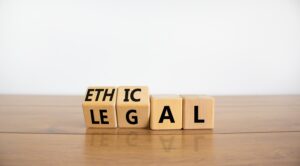Ethics is the science of a standard human conduct that informs people about how to live or how to behave in a particular situation. The law is a system of rules and regulations that regulate the conduct and relations of individuals and groups in society⁵. The relationship between ethics and the law is that they both aim to **guide human actions** and **promote social order**², but they differ in their sources, scopes, and sanctions. Ethics and the law are related because they both reflect the values and norms of a society or a community. Ethics is derived from the Greek word ethos (character), and from the Latin word mores (customs). The law is created by the government, which may be local, regional, national or international¹. Ethics and the law both seek to protect the rights and interests of individuals and groups, such as by requiring informed consent, respecting privacy, or ensuring fairness³.

Ethics and the Law
Ethics and the law differ because ethics is more general and abstract, while law is more specific and concrete. Ethics provides guidelines and principles that inform people about what is the right thing to do in all aspects of life, while the law provides rules and regulations that prescribe what people must or must not do in certain situations. Ethics is more flexible and adaptable, while law is more rigid and formal. Ethics has no legal binding or enforcement, while law creates a legal binding and may impose sanctions or penalties for violations. In summary, ethics and the law are related because they both aim to guide human actions and promote social order based on the values and norms of a society or a community. They differ in their sources, scopes, and sanctions, as ethics is more general, abstract, flexible, and non-binding, while law is more specific, concrete, rigid, and enforceable.
Ethics in Jurisprudence
Ethics is the study of how people should act or what values they should follow. There are different schools of ethics that have different approaches to ethical reasoning and decision-making. Some of the major schools of ethics identifiable in US jurisprudence are:
– Virtue ethics: This school focuses on the character and virtues of the person who acts, rather than on the rules or consequences of the action². According to virtue ethics, a good person is someone who has cultivated moral habits and dispositions, such as courage, honesty, justice, and wisdom. Virtue ethics can be traced back to ancient Greek philosophers such as Aristotle and Plato.
– Consequentialist ethics: This school focuses on the outcomes or consequences of the action, rather than on the motives or intentions of the person who acts. According to consequentialist ethics, a good action is one that produces the best results for the most people, or maximizes happiness or utility. Consequentialist ethics can be divided into different subtypes, such as utilitarianism, which is based on the principle of the greatest happiness for the greatest number.
– Deontological ethics: This school focuses on the rules or duties that govern the action, rather than on the character or consequences of the person who acts². According to deontological ethics, a good action is one that follows a universal moral law or a categorical imperative, regardless of the situation or outcome. Deontological ethics can be traced back to rationalist philosophers such as Immanuel Kant and John Rawls.
These schools of ethics are not mutually exclusive, and some jurists may combine elements from different schools to form their own ethical views. However, they represent some of the main ways that ethics can be applied to law and justice.
Ethics in Lawyering
The relationship between ethics and the law is the study of how ethical principles and values influence or shape the creation and application of laws. Legal malpractice is the term for negligence, breach of fiduciary duty, or breach of contract by a lawyer during the provision of legal services that causes harm to a client. The main difference between these two topics is that the relationship between ethics and the law is a theoretical and philosophical inquiry, while legal malpractice is a practical and legal issue. The former deals with questions such as what is the source and purpose of law, what are the moral foundations of law, and how should law be interpreted and enforced in light of ethical considerations. Legal malpractice deals with questions such as what are the duties and obligations of lawyers to their clients, what are the standards of professional conduct and competence for lawyers, and how can clients seek redress or compensation for lawyer misconduct.
Another difference between these two topics is that the relationship between ethics and the law is relevant for all members of society, while legal malpractice is relevant mainly for lawyers and their clients. The former affects how laws are made and applied in various domains such as human rights, criminal justice, environmental protection, and business regulation. The latter affects how lawyers perform their roles and responsibilities in representing their clients in various legal matters such as litigation, transaction, mediation, or arbitration. In summary, the relationship between ethics and the law is a broad and abstract topic that explores the moral dimensions of lawmaking and law enforcement. Legal malpractice is a narrow and concrete topic that examines the legal consequences of lawyer negligence or wrongdoing. Both topics are important for understanding the role and function of law in society.
Are you a technical, business or legal professional who works with technology adoption? Do you want to learn how to apply ethical frameworks and principles to your technology work and decision-making, understand the legal implications and challenges of new technologies and old laws, and navigate the complex and dynamic environment of technology innovation and regulation? If so, you need to check out this new book: Ethics, Law and Technology: Navigating Technology Adoption Challenges. This book is a practical guide for professionals who want to learn from the experts and stay updated in this fast-changing and exciting field.
